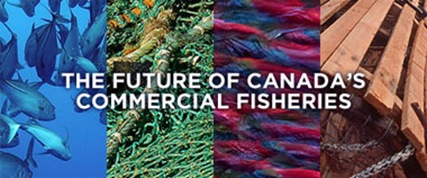The Department of Fisheries and Oceans is holding a consultation on the future direction of the commercial fishery in Canada. it builds off the sustainable fisheries framework announced in 2009.
Click on the picture to head off to the part of the website where you can leave your comments online.
Here’s how the DFO website describes it:
Canada is blessed to be rich in natural resources, including the longest coastline in the world. It is estimated that 80,000 Canadians make their livings directly from fishing and fishing related activities.
Fisheries and Oceans Canada is committed to supporting the economic profitability of those fisheries, while striving to ensure that fish stocks are healthy and abundant for future generations. The Department is modernizing the way it does business to enable the industry to address both current and future challenges. This will ultimately lead to fisheries that are more sustainable, more profitable and more globally competitive for the long term. Fisheries and Oceans Canada has already taken some important steps after considering feedback from industry, Aboriginal groups and others. But more needs to be done.
The Department is talking with Aboriginal groups, the fishing industry, non-governmental organizations and fisheries experts, as well as the Canadian public. We recognize the importance of transparency as we move forward with specific elements of fisheries management modernization. We also appreciate the value that diverse perspectives can bring to the development of these policies. Together, we will build a path towards a more sustainable, stable and economically prosperous fishing industry.
There’s also a consultation document [pdf] that lays out the basis for the discussion. You can also find the bits of it and some presentations broken down for easier reading online at the DFO website: here.
This will get you started. Your humble e-scribbler will be looking at some specific aspects of this consultation over the next week or so as well as on some of the other issues that people in this province should be addressing but aren’t.
A warning: if you think that this set of 1980s solutions to 1970s problems from the last provincial election represents the cutting edge of fisheries policy for the 21st century, you will probably not be too comfortable reading any of this stuff.
- srbp -
